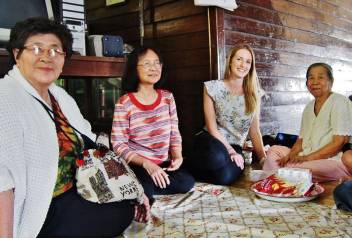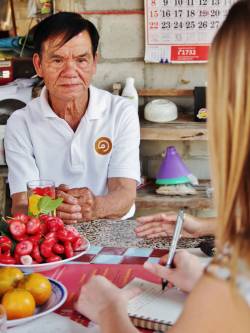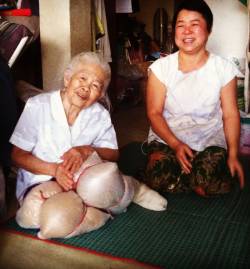 I’ve just returned from Thailand where I experienced first-hand what HelpAge seeks to communicate; that older people are their best advocates for change and a valuable recourse in their communities.
I’ve just returned from Thailand where I experienced first-hand what HelpAge seeks to communicate; that older people are their best advocates for change and a valuable recourse in their communities.
I saw how older people’s associations are finding new ways of caring for each other, earning money to support their families and developing local disaster risk reduction plans.
As a campaigner, I am particularly interested in how people negotiate, advocate and create change. To be able to see in person how older people are doing this was extremely exciting.
Solutions for community care
Care in older age is something we are all going to have to think about, either for ourselves or a family member. As societal structures shift, the way home-care is provided is also changing, creating gaps in the care provided for older people.
Younger people often move to bigger cities for work leaving older family members behind. On my visit I saw how older people were responding to these changes and how older people’s associations are finding other ways of caring for older people in their communities.
I visited a home-care programme in a district in Chiang Mai that was originally set up by our Affiliate FOPDEV over ten years ago. When the programme started, home-care volunteers were trained by FOPDEV, but as time has passed older people’s associations manage the programme themselves.
 I met Prapai, a 67-year-old home-care volunteer. Although she is older herself she feels it’s important to give back to her community. Prapai started volunteering with FOPDEV ten years ago, and now trains other older people to be volunteers. The volunteers help with cooking, cleaning, washing and physiotherapy. She coordinates 20 volunteers.
I met Prapai, a 67-year-old home-care volunteer. Although she is older herself she feels it’s important to give back to her community. Prapai started volunteering with FOPDEV ten years ago, and now trains other older people to be volunteers. The volunteers help with cooking, cleaning, washing and physiotherapy. She coordinates 20 volunteers.
She said: “I visit older bed ridden people because I want them to be healthy and to stay as well as they can. I train other volunteers so we can be a network of older people that care for one another.”
Taking action on disaster risk reduction
Three hours north of Chiang Mai I visited Fang, a mountainous community that experiences floods and bushfires every year. In 2011, 50 homes were lost and two people killed in a big flood. I met Boonpeng, an older people’s association leader who told me about their advocacy work.
He said: “The idea of doing disaster risk reduction (DRR) work came from us, the older people. We worked with local authorities to get a budget to develop DRR plans. It took time to convince them, but now ten villages in the district have plans.”
Boonpeng told me the older people’s associations in the district have identified all of the older bed ridden people in their villages, and will be doing a test evacuation in a couple of weeks.
Boonpeng also told me: “If we can use the knowledge older people have about their communities, we won’t have to worry as much about natural disasters.”
Resource in accessing healthcare
 In Fang I attended an older people’s association meeting where I heard an incredible story.
In Fang I attended an older people’s association meeting where I heard an incredible story.
“Our group was visiting bed ridden older people in the village. One day we visited Lah who is 81. It was the first time we had visited her and we found out she hadn’t been able to walk for ten years.”
They found out that Lah didn’t receive a disability pension, which she is entitled to. The older people’s association helped her apply for the pension so she can receive an extra 800 baht (US$24.5) per month and get a wheelchair.
Without that visit, how many more years would she have suffered? It confirmed my belief that older people’s associations play a vital role in their communities.
The future
Thailand has universal health coverage and a social pension, but older people face challenges in accessing these benefits.
The older people’s associations I visited will continue to tell decision makers that they matter and can make a difference. They definitely convinced me of the powerful and versatile resource an older people’s association can really be.
Find out more about our work to support older people in East Asia.
